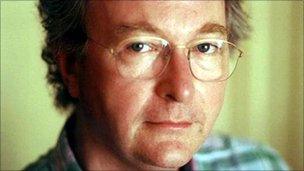Authors condemn school library cuts
- Published

Philip Pullman said the closures were an 'absolute disgrace'
Top children's authors have condemned increasing cuts to school library services in England.
Services providing books to up to 600,000 pupils have been axed in the past year, research by the Times Educational Supplement (TES) suggests.
Author Philip Pullman said schools were not properly funded and were choosing between paying for building maintenance and using a library service.
The government said head teachers knew what was best for their pupils.
Mr Pullman condemned the cuts as an "absolute disgrace".
Tough choices
"The government doesn't fund schools properly, so schools have to make the choice between repairing the toilet roof and having a school library service," the best-selling author told the TES.
Former children's laureate Michael Rosen said: "School library services have been decimated, but they are central to education.
"I cannot think of anything more important in education than to fill classrooms full of books that children can browse through."
The services not only provide fresh stocks of books to schools, they also offer a range of resources and help organise visits from authors.
But local authorities are not obliged to run a school library service. Currently, just 85 councils out of more than 150 with responsibility for schools run their own dedicated service.
The TES asked 66 of the surviving services about the future. Some 46 said they were not making any changes, but 10 said falling demand had led to changes including cutting what they offer or increasing charges.
A further 10 authorities said the situation was unclear.
In the past 12 months alone, services have been scrapped in large local authorities including Kent and Birmingham.
'Crystal clear'
They have also been axed in Gateshead, Cambridgeshire and Sutton. Greenwich, which suspended its service in 2009, confirmed this week that it would not be re-opening.
General secretary of the National Association of Head Teachers, Russell Hobby, said: "A library has more effect on reading than a phonics check.
"Being able to have a wide range of books that appeal to different interests will do more to drive literacy than some of the government's strategies."
A spokesman for the Department for Education said: "Ministers have been crystal clear about the centrality of literacy.
"Teachers and heads need no reminding of the importance of school libraries - they know what's best for their pupils and so there are no plans to make it a statutory requirement.
"We are targeting as much funding as possible directly into heads' hands so they can make the right choices about school library provision and book resourcing."
- Published4 February 2011
- Published24 August 2010